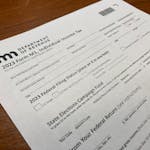Medicare has begun covering Boston Scientific Corp.'s Watchman device for preventing ischemic stroke, creating a much larger population of patients for a product pegged for $500 million in annual sales someday soon.
The Watchman is a wire-and-mesh plug developed by Minnesota cardiologists to permanently seal off a pocket of tissue in the heart called the left atrial appendage, where blood clots often form in patients with atrial fibrillation. The Watchman is an alternative to blood-thinning drugs, and is the only medical device approved to close off the pouch of tissue in the heart.
"The majority of patients who are candidates for Watchman are covered by Medicare. We're really pleased now that there's clarity around payment," said Dr. Ken Stein, chief medical officer of rhythm management at Boston Scientific.
Effective immediately, Medicare will pay an average of $16,720 to hospitals that implant the device, though the actual payments can increase to more than $22,000 if the patient had major complications or comorbidities. That price includes the cost of the device and the procedure to implant it.
The company trained and equipped about 100 U.S. hospitals on the Watchman procedure within 10 months of FDA approval, and it plans to expand to quadruple that figure in coming years.
Massachusetts-based Boston Scientific, which has about 5,000 employees in Minnesota, saw its stock climb about 5 percent on Tuesday to $16.87.
Medicare's announcement late Monday resolved several lingering issues in the company's favor.
First, Medicare will pay for the procedure in patients who have good medical reasons not to take cheaper blood-thinning drugs to prevent blood clots, potentially including those at risk of bleeding out after a bad fall.
Medicare's initial proposal last November would have limited coverage only to patients who were medically unable to take blood thinners.
The final decision also requires Medicare Watchman patients to enroll in a national registry that will track complications and rates of stroke and death. But the final rule eliminated an earlier proposal to create a control arm of the registry study that would have looked at similar rates of complications in patients taking blood-thinning drugs.
The Watchman has followed a winding path to full Medicare coverage.
It was about a decade ago that Minneapolis cardiologists first sketched out the idea for a device that could seal off the left atrial appendage in patients with fluttering hearts for whom the traditional therapy — years of daily blood-thinning drugs — wasn't working.
In patients with atrial fibrillation, the left atrial appendage is a breeding ground for clots that can travel through the circulatory system and block off blood vessels in the brain, causing ischemic stroke. The Watchman, implanted using a long catheter snaked through the blood vessels, is supposed to permanently address the problem by sealing off the appendage.
The device was first commercialized outside the United States in 2009 by a Plymouth company called Atritech, Inc.
Boston Scientific acquired Atritech in 2011 after an 800-person randomized clinical trial found Watchman reduced the risk of stroke, death and embolism, compared to long-term use of blood-thinning drugs.
Some physicians remained skeptical of the evidence, and other studies documented higher risks of some complications.
Three different FDA expert panels eventually voted on approval of the Watchman before the full agency approved it last year. During that process new studies showed Watchman patients should go on blood-thinning drugs for 45 days after implantation to prevent any short-term rise in stroke risk.
That meant the device was not approved for patients who can't tolerate six weeks on blood thinners.
Still, company officials said the market potential for the Watchman is significant.
They said about 6 million Americans have atrial fibrillation, and about three-quarters of them have an elevated risk for stroke. Of the AFib patients with elevated risk, about half are not taking the recommended anti-coagulation drugs — the population Watchman is designed for.
Joe Carlson • 612-673-4779
Twitter: @_JoeCarlson




